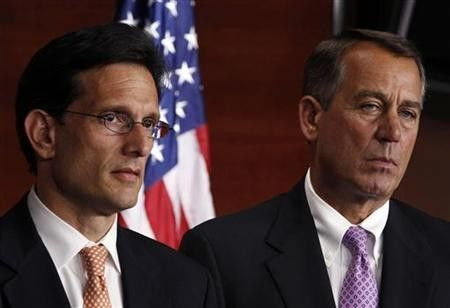Cantor Gives 'Gang of Six' Plan Mixed Review

The Gang of Six was finally able to agree to a deficit-reduction plan on Tuesday, but House Majority Leader Eric Cantor, R-Va., only gave it a mixed review, citing his concern about the plan's revenue target while saying it proposes some constructive ideas.
We've begun reviewing the Gang of Six proposal and while there are still portions that are unclear and need more detail, this bipartisan plan does seem to include some constructive ideas to deal with our debt, Cantor said in a statement.
The group's plan calls for more than $4 trillion to be trimmed off the deficit over the coming decade. According to a copy of a summary of the Gang of Six plan, it would impose $500 billion in deficit cuts, cut Social Security and non-security spending over 10 years with spending caps, make the Medicare and Medicaid health care programs operate more efficiently and abolish the Alternative Minimum Tax.
The tax reform outline would set up three income tax rates: a bottom rate of 8-12 percent; a middle rate of 14-22 percent and a top rate of 23-29 percent to replace the current system that has a bottom rate of 10 percent, with five additional rates topping out at 35 percent, The Associated Press reported. It would also reduce, but not eliminate, tax breaks on mortgage interest, higher-cost health plans, charitable deductions, retirement saving and tax credits for families and children.
Cantor said this plan, in some aspects, overlaps with what he and Speaker John Boehner, R-Ohio, have discussed with President Barack Obama. Still, he praised the Gang of Six's call for a reduction in personal income tax rates.
That said, I am concerned with the Gang of Six's revenue target, Cantor added. The plan fails to significantly address the largest drivers of American's debt, and it is unclear how the goals of tax and entitlement reforms would be enforced. I continue to caution that a tax increase is the wrong policy to pursue with so many Americans out of work.
A Boehner spokesman, Michael Steel, gave an assessment of the Senate proposal that mirrored Cantor's, saying while it shares similarities with an approach discussed with Obama, it falls short in some important areas.
© Copyright IBTimes 2025. All rights reserved.





















